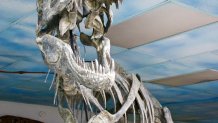A beloved North County San Diego museum that has for two decades been a source of knowledge on paleontology for children and adults alike will soon go the way of the dinosaur.
The founders of the Roynon Museum of Earth Sciences and Paleontology in Escondido announced that June 30 would be their last day open to the public, calling their closure the "end of an era" in a heartfelt message on their website.
"Starting in 1937 and still going strong today the Roynon Era is not coming to an end anytime soon," the message read. "But one of the Periods within the Roynon Era is ending. It is the Period we refer to as the Museum Period."
Museum Director Jeannie Nutter said the reason for the closure is two-fold: Founder Keith Roynon is retiring after years at the educational helm of the museum, where he provided tours and three-hour classes to children the majority of every week; and the museum cannot afford to pay someone to fill the void that would be left without him.

"This has been a very difficult decision and more than a few tears have been shed. But as they say, it is best to go out on top and we all feel that is where the museum is right now," Nutter wrote in a statement.
The museum itself was founded in 2000 as a non-profit but it began to form decades earlier thanks to Roynon's passion for acquiring fossils -- a collection that has grown since his childhood to include thousands of specimens.
Local
"Mr. Raynon, when he was growing up in Santa Cruz at about five or six started collecting sharks teeth and then he found a few bones and that just kind of led him," Nutter said. "Of course as he got older it kind of ballooned into a hobby that kind of, he says, got out of control," she said with a laugh.
Among the finds at the Ronyon Museum are an estimated more than 10,000 specimens -- of fossilized ferns, real dinosaur eggs, meteorites, even fossilized dinosaur waste. Only about 15 percent of the museum is made up of replica fossils, Nutter said.
The collection, some of which belong to the museum's educational foundation, will, for the most part, be donated to another museum. Roynon's personal artifacts will be put up for sale or donated but he hopes only to sell to new owners who will appreciate them.

Visitors of the museum will embark on a tour of time from the Precambrian to the Pleistocene time periods. Nutter said it is hard to determine how many kids have been through the museum but has heard stories of the museum's impact.
"I think the hardest thing is to know that this isn’t going to be there anymore for the children, that there isn’t going to be a class like this, they aren’t going to be able to hold things in their hand," she said.
Guests are encouraged to give the fossils a proper send-off by visiting the museum, located at 457 East Grand Ave, Escondido, one more time before it is closed for good.
Tickets are free for children under two, $5 for children up to age four, $8 for kids and teens and $12 for adults.
The Roynon Museum is open 1 to 5 p.m. Monday through Friday and 10 a.m. to 4 p.m. on Saturday except for May 10, 13, 14, 16, 17, 20 and some holidays. Management urges anyone planning a visit to check their website first since their volunteer staff can affect their operating schedule.



